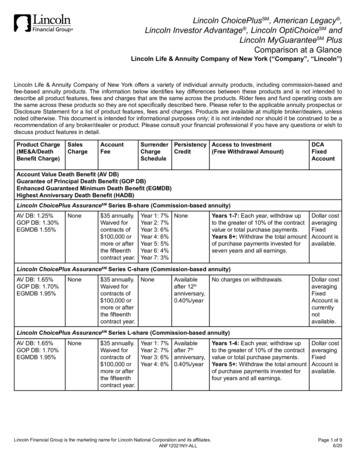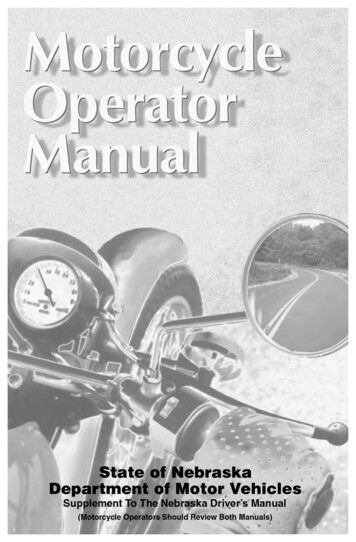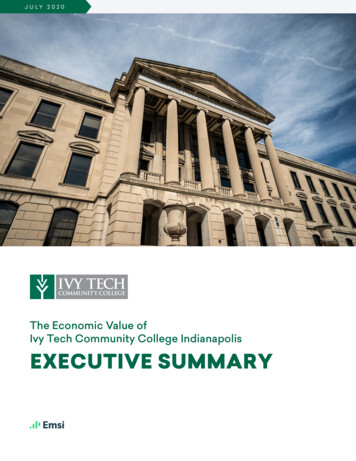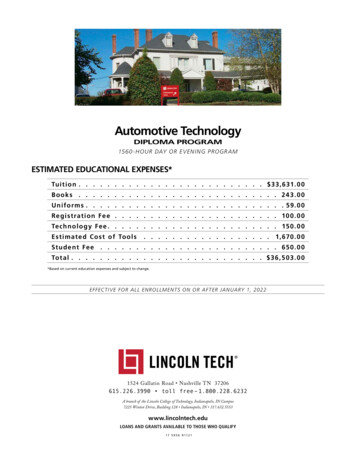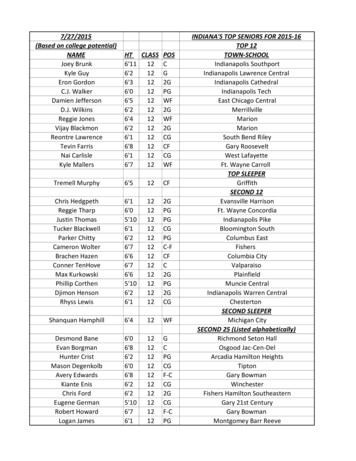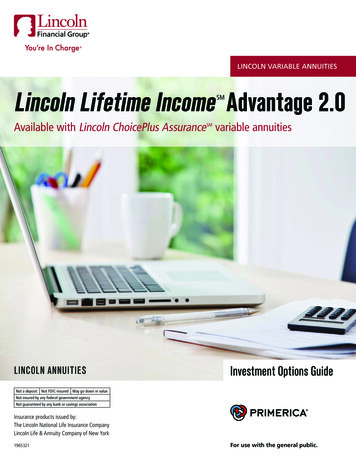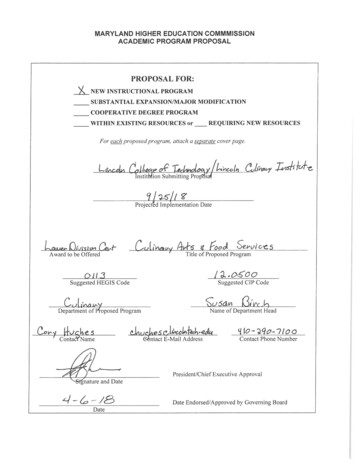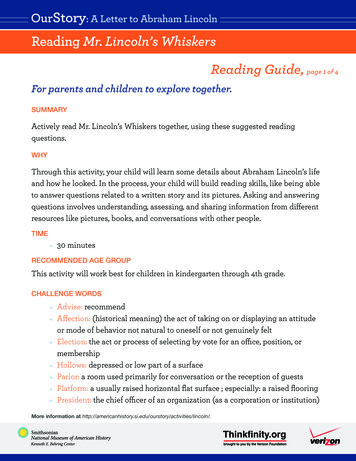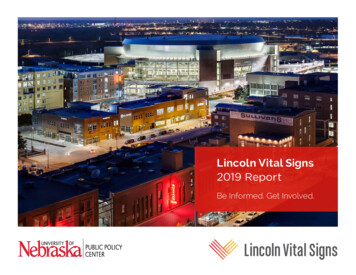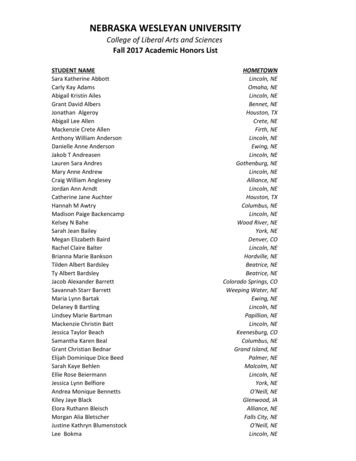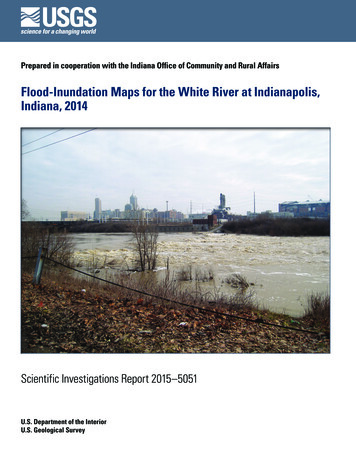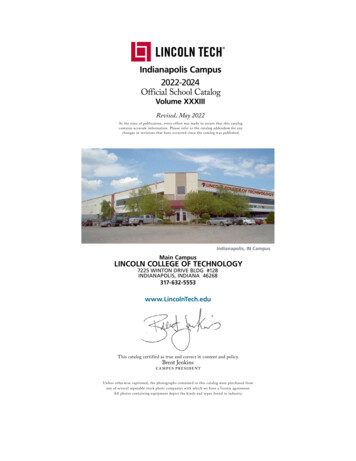
Transcription
Indianapolis Campus2022-2024Official School CatalogVolume XXXIIIRevised, May 2022At the time of publication, ever y effort was made to assure that this catalogcontains accurate information. Please refer to the catalog addendum for anychanges or revisions that have occurred since the catalog was published.Indianapolis, IN CampusMain CampusLINCOLN COLLEGE OF TECHNOLOGY7225 WINTON DRIVE BLDG #128INDIANAPOLIS, INDIANA 46268317-632-5553www.LincolnTech.eduThis catalog certified as true and correct in content and policy.Brent JenkinsCA MPUS PR ESIDEN TUnless other wise captioned, the photographs contained in this catalog were purchased fromany of several reputable stock photo companies with which we have a license agreement.A ll photos containing equipment depict the k inds and t y pes found in industr y.
Indianapolis Campus2022-2024Official School CatalogVolume XXXIIIRevised, May 2022Table of ContentsINTRODUCTION . . . . . . . . . . . . . . . . . . . . . . . . . . . 3Training Methods and School Facilities . . . . . . . . . . . . . . 4Indianapolis . . . . . . . . . . . . . . . . . . . . . . . . . . . . .4Purpose, Objectives and Employment Assistance . . . . . . . . 5Our Mission . . . . . . . . . . . . . . . . . . . . . . . . . . . . . 5History of the School . . . . . . . . . . . . . . . . . . . . . . . . 5Educational Philosophy . . . . . . . . . . . . . . . . . . . . . . 5A Letter from the President & CEO . . . . . . . . . . . . . . . . 6CAREER PROGRAMS . . . . . . . . . . . . . . . . . . . . . . . . 7CERTIFICATE PROGRAMSWelding and Metal Fabrication Technology . . . . . . . . . . . 8DIPLOMA PROGRAMSAccredited Master Automobile Service Technology . . . . . . 9Automotive Technology . . . . . . . . . . . . . . . . . . . . . 10Automotive Technology with VolkswagenEducation Partnership . . . . . . . . . . . . . . . . . . . . . 11CNC Machining and Manufacturing Technology . . . . . . . . 12Collision Repair and Refinishing Technology . . . . . . . . . . 13Diesel and Truck Technology . . . . . . . . . . . . . . . . . . 14Electrical and Electronic Systems Technology . . . . . . . . . . 15Medical Assistant . . . . . . . . . . . . . . . . . . . . . . . . . 16Welding Technology . . . . . . . . . . . . . . . . . . . . . . . 17DEGREE PROGRAMSAutomotive Service Management . . . . . . . . . . . . . . . . 18Collision Repair and Refinishing Service Management . . . . 19Diesel and Truck Service Management . . . . . . . . . . . . . 20Electrical and Electronic Systems TechnologyService Management . . . . . . . . . . . . . . . . . . . . . 21COURSE DESCRIPTIONS . . . . . . . . . . . . . . . . . . . . . . 22GENERAL INFORMATION . . . . . . . . . . . . . . . . . . . . . 30Accreditations and Approvals . . . . . . . . . . . . . . . . . . 31Compliance with City, State, and Federal Regulations . . . . . 31Notice to Students . . . . . . . . . . . . . . . . . . . . . . . . 31Statement of Ownership . . . . . . . . . . . . . . . . . . . . . 31Nondiscrimination and Harassment Policy . . . . . . . . . . . 31ADMISSIONS POLICIES . . . . . . . . . . . . . . . . . . . . . . 32Admission Requirements . . . . . . . . . . . . . . . . . . . . 33Orientation Program . . . . . . . . . . . . . . . . . . . . . . . 33Introductory Period of Enrollment . . . . . . . . . . . . . . . 33Single Courses . . . . . . . . . . . . . . . . . . . . . . . . . . . 33Veterans Training . . . . . . . . . . . . . . . . . . . . . . . . . . . . . . . . . 33FINANCIAL AID INFORMATION . . . . . . . . . . . . . . . . . 34Financial Aid . . . . . . . . . . . . . . . . . . . . . . . . . . . 35Scholarships . . . . . . . . . . . . . . . . . . . . . . . . . . . . 35Tools . . . . . . . . . . . . . . . . . . . . . . . . . . . . . . . . 35Cancellation and State Refund Policy . . . . . . . . . . . . . . 36Return of Title IV Federal Student Aid . . . . . . . . . . . . . 37The Refund Process . . . . . . . . . . . . . . . . . . . . . . . . 37Veterans Affairs Refund Policy . . . . . . . . . . . . . . . . . . 37GENERAL STUDENT INFORMATION . . . . . . . . . . . . . . . 38Housing . . . . . . . . . . . . . . . . . . . . . . . . . . . . . . 39Holidays . . . . . . . . . . . . . . . . . . . . . . . . . . . . . . 39Inclement Weather . . . . . . . . . . . . . . . . . . . . . . . . 39Student Complaint/Grievance Procedure . . . . . . . . . . . . 39Visitors . . . . . . . . . . . . . . . . . . . . . . . . . . . . . . 40Official Student Communication . . . . . . . . . . . . . . . . 40Employment Assistance . . . . . . . . . . . . . . . . . . . . . 40ACADEMIC INFORMATION . . . . . . . . . . . . . . . . . . . . 41Class Schedules . . . . . . . . . . . . . . . . . . . . . . . . . . 42Certificate, Diploma and Degree Programs . . . . . . . . . . . 42Student Conduct . . . . . . . . . . . . . . . . . . . . . . . . . 42Attendance . . . . . . . . . . . . . . . . . . . . . . . . . . . . 43Blended Delivery . . . . . . . . . . . . . . . . . . . . . . . . . 43Make-Up . . . . . . . . . . . . . . . . . . . . . . . . . . . . . 44Consultation and Tutoring . . . . . . . . . . . . . . . . . . . 44Student Advising . . . . . . . . . . . . . . . . . . . . . . . . . 44Americans with Disabilities Act (ADA) Policy . . . . . . . . . . 44Course and Academic Measurement . . . . . . . . . . . . . . 44Grading . . . . . . . . . . . . . . . . . . . . . . . . . . . . . . 45Satisfactory Academic Progress . . . . . . . . . . . . . . . . . 45Introduction . . . . . . . . . . . . . . . . . . . . . . . . . . 45Qualitative Measure of Progress(Grade Point Average) . . . . . . . . . . . . . . . . . . . . 45Quantitative Measures of Progress(Pace of Progression and Maximum Time Frame) . . . . . 45Evaluation Period . . . . . . . . . . . . . . . . . . . . . . . 45Failure to Meet Standards . . . . . . . . . . . . . . . . . . . 46Appeals and Probation . . . . . . . . . . . . . . . . . . . . 46Notification of Status and Appeal Results . . . . . . . . . . 46Reinstatement . . . . . . . . . . . . . . . . . . . . . . . . . 46Treatment of Grades and Credits . . . . . . . . . . . . . . . 46Satisfactory Academic Progress for VA Beneficiaries . . . . . . 47Transcripts (Progress Records) . . . . . . . . . . . . . . . . . . 47Transfer Credits . . . . . . . . . . . . . . . . . . . . . . . . . . 47Withdrawals and Incomplete Grades . . . . . . . . . . . . . . 48Course Repeats . . . . . . . . . . . . . . . . . . . . . . . . . . 48Official and Unofficial Withdrawals . . . . . . . . . . . . . . 48Grade Appeal Policy . . . . . . . . . . . . . . . . . . . . . . . 48Leave of Absence . . . . . . . . . . . . . . . . . . . . . . . . . 48Re-entrance . . . . . . . . . . . . . . . . . . . . . . . . . . . . 49Requirements for Graduation . . . . . . . . . . . . . . . . . . 49CAMPUS INFORMATION . . . . . . . . . . . . . . . . . . . . . 50Meet our School Staff and Instructors . . . . . . . . . . . . . 51Corporate Administration . . . . . . . . . . . . . . . . . . . . 51School Staff and Faculty . . . . . . . . . . . . . . . . AddendumSchedule of Fees . . . . . . . . . . . . . . . . . . . . AddendumDefinitive School Calendar . . . . . . . . . . . . . . Addendum2
IntroductionTraining Methods and School Facilities . . . . . . . . . . . . . . 4Indianapolis . . . . . . . . . . . . . . . . . . . . . . . . . . . . .4Purpose, Objectives and Employment Assistance . . . . . . . . 5Our Mission . . . . . . . . . . . . . . . . . . . . . . . . . . . . . 5History of the School . . . . . . . . . . . . . . . . . . . . . . . . 5Educational Philosophy . . . . . . . . . . . . . . . . . . . . . . 5A Letter from the President & CEO . . . . . . . . . . . . . . . . 63
IntroductionTraining Methods andSchool FacilitiesTo succeed in the demanding fields ofautomotive, diesel and truck, electronicssystems and manufacturing technologytakes training. Training that puts youbehind microprocessors, turbochargers,pyrometers, plungers, fire alarms, intrusiondetectors, multi-axis CNC machines, andcontrollers. Training you can get yourhands on. Training you can take straight tothe job market.Lincoln College of Technology isdedicated to providing the specifictraining that puts you next to theprofessionals. You’ll really appreciate theinstructors at Lincoln — they not onlycan tell you the whys, but they can andwill show you the hows. You will receivehands-on training that prepares you tocope with today’s technology and lays asolid foundation to enable you to quicklymaster future developments. That kind ofpractical training sets LCT students apartfrom the crowd.Upon graduation, you enter the fieldprepared to quickly become a skilledtechnician. How far your skills takeyou depends entirely on you. LCT’sunique programs allow specialization orcomprehensive training depending uponyour desires, needs, and prior experienceor training.Lincoln’s Indianapolis campus has beena leading provider of postsecondary careertraining since the school opened its doorsto students in 1961. In response to rapidgrowth, Lincoln moved to a new facilityin the summer of 2004. The school nowoccupies a modern 126,000 square footfacility located at 7225 Winton Drive inthe northwest suburbs of Indianapolis.Tour our training centers, and you’llfind all the appropriate materials forthe instruction in automotive, diesel,electronics, manufacturing, and collisionrepair, welding, and even a medicalprogram! The library is convenient, andthe educational resources provide handyreferences for questions or problems.There is also internet access in labs.Electrical and Electronic SystemsTechnology program (EEST) utilizesdedicated and specialty classrooms inaddition to a common lab area containingtraining stations and a practice buildingstructure. This lab room structure is asimulated one or two-story building thatconsists of various wall, ceiling, floor, androof construction styles and configurationsthat will be found and encountered incommercial and residential applications.These construction variations also havecutaway access to their internal structure,so as to allow the students to observe andunderstand the construction methodsand materials they will work with in thefield. Installation of equipment and wiringmethods are practiced and performed onthis structure in a lab environment.The specialty classrooms accommodatetrainers and equipment related tocomputers, materials & methods, BICSIequipment & installation, security & firealarms, and electronics.More than ever, today’s collisionrepair technicians must possess extensiveversatility and knowledge. The complexityand variety of repair techniques andmaterial used in today’s vehicles andrelated equipment has increased at a pacethat is a challenge for technical traininginstitutions. Lincoln College of Technology,Indianapolis campus is answering thatchallenge with a new program that offersa skills set in the diverse area of vehiclebody and frame repair as well as surfacerefinishing. LCT is also responding tothe projected increase in demand fortechnicians in the collision repair and autobody specialty fields.Our welding program has tripled in sizeover the past year as demand for a solideducation continues to grow. Througha partnership with Miller Electric, stateof the art welding equipment has beenadded to increase the number of weldingbooth from 20 to 60 in very short order.Students will first learn and understandthe importance of shop safety and sit forthe OSHA-10 exam. The students canearn up to 29 NCCER Credentials in ourshort program, and up to 32 in our longerpipe program. The students will move onto learn both Oxy/fuel and Plasma cutting,SMAW, GMAW, FCAW, and GTAWwelding procedures and positions.Our Engine Tune-up Lab boastsboth conventional and current computertesting equipment for the diagnosis ofelectrical, fuel control, and emissionsystems. The computer wheel balancer, andthe computerized four-wheel alignmentsystem in Auto Chassis and Brakes, and theDetroit Diesels, Caterpillar, and Cumminsengines in the Diesel Department are justa few examples of the training equipmentavailable in our classrooms and labs. Dieselfuel pumps, transaxles, fuel injectors, andautomatic transmissions are all part of thetotal Lincoln training environment.Through a partnership with HaasAutomation LLC, a leading global providerof CNC manufacturing technology andequipment, Lincoln Tech’s IndianapolisCampus proudly features the GeneHaas Center for Advanced Automation.Featuring ten Haas CNC mills, lathesand multi-axis machines, the Gene HaasCenter provides with the opportunity forhands-on training that prepares themfor exciting career opportunities in thegrowing American manufacturing industry.4The 5,000 square foot training centeralso incorporates manual machines andutilization of a customized, PC-basedvirtual machining environment. Lincolnand Haas are excited and eager to showstudents the current state of manufacturing- and its future! - which through advancedtechnology replaces the dark, dirtysweatshops of the past with safe, clean, welllit and comfortable working environments.There is an ever-increasing demandfor well-trained multi-skilled medicalprofessionals. Our Medical Assistantprogram prepares students to performthe multitude of tasks requiredincluding but not limited to phlebotomy,electrocariograms (EKG), assist in minorsurgery, billing, coding and electronichealth records. Gradates of the programare prepared and encouraged to sit for theRegistered Medical Assistant (RMA) exam.We are continuously in touch withindustry representatives concerning ourtraining programs. As needs arise, LincolnCollege of Technology tries to be responsive.Our curriculum is constantly under revisionto keep us current with industry.Since 1946, when J. Warren Daviesfounded the Lincoln Technical Instituteschool system, emphasis has been onpractical training for the practical student.We’re proud of that philosophy; and you’llbe proud to have made the choice ofLincoln College of Technology training.IndianapolisAlive, Dynamic, Exciting, Growing:That’s Indianapolis, Explore it!Discover the Gainbridge House; LucasOil Stadium, home of Super Bowl XLVI;the Major Taylor Velodrome/bicycle racingtrack; the Natatorium, world’s largestindoor swimming and diving complex; theIndianapolis Sports Center, home of the U.S.Open Clay Court Tennis Championshipand outdoor summer concerts. Indianapolisis known as the Racing Capital of theWorld. The Indianapolis Motor Speedway,home of the Brickyard NASCAR races, the“Indianapolis 500” Indy car races, and theRed Bull Grand Prix Motorcycle race in theMidwest is a short distance from the school.Also, Lucas Oil Raceway Park, home of theU.S. National NHRA drag racing and manyother regional and national events, is nearby.If it’s professional sports you’re looking for,Indianapolis offers Colts Football, PacersBasketball and Indians (minor league)Baseball. Best of all, these facilities are allwithin minutes of the Lincoln campus!Indianapolis also boasts one of thelargest municipal parks in the U.S.; EagleCreek – 5,200 acres of woods and wateroffering recreation from fishing and sailingto a zip line experience to cross countryskiing. Parks dot the entire city, 166 in
Introductionall, so an outdoor afternoon for frisbees orstudies is always nearby.Evenings never lack entertainment:a city full of restaurants, theaters, andmuseums is waiting for you.Enjoy it.Purpose, Objectives andEmployment AssistanceLincoln College of Technology trainingbegins on a level students can confidentlyhandle. A discussion of all programs offeredbegins on page 8, but the school’s overallobjectives run throughout our programs.All automotive, collision, diesel, andskill trades programs offered begin withthe basic fundamentals of componentdesign, purpose and location, allowing anyperson not previously exposed to this areaof study to confidently enroll and begintraining. Once the basics are established,each course then provides students withthe advanced up to date theory andprocedures for the proper diagnosis andservice of the modern automobile andtruck. In electronics and manufacturingcourses, students work with industryrelated equipment and machines. Ourcomprehensive training is the next naturalstep for the student graduating from ahigh school vocational program. Statedsimply, teaching skills to the unskilled,refining skills of the semi skilled andhelping them to find gainful employmentin the industry is the overall objective ofLincoln College of Technology.Recently introduced, the Career Edgeprogram is a series of unique presentationsto assist students develop life skills whilein school and as they begin exciting newcareers. Made up of several individualcomponents, New Student Orientation,Early Student Engagement and CareerEdge, this program gives students accessto resources that will help them leadproductive lives and grow in their careers.The Career Edge program uses classroomactivities, one-on-one and team coaching,technical tools, and feedback forums todeliver valuable concepts and exercises forlife-long development.This preparation which includescareer workshops as well as the technicalinstruction enables our students to findjobs within their chosen careers for whichthey’re qualified—a career they’ll enjoywith jobs they can get their hands on.Although Lincoln College of Technologyoffers no guarantee of employment,considerable effort is put forth to givestudents the interpersonal skills neededto secure today’s challenging positions. Inaddition, our Career Services Office willbe working with you in making industrycontacts as well as periodically bringingemployers at the school for publishedcareer days.LCT is constantly in contact withindustry to advise them of students andgraduates available for employment. Ourinstructors and staff assist our graduatesin obtaining successful careers by helpingacquire and prepare for employmentinterviews. Lincoln graduates are workingthroughout the U.S. Employability is thedifference Lincoln training makes!Our MissionLincoln’s mission is to provide superioreducation and training to our studentsfor in-demand careers in a supportive,accessible learning environment,transforming students’ lives andadding value to their communities.History of the SchoolLincoln Technical Institute, Inc., parentorganization of the Lincoln TechnicalInstitute school system, was founded in1946 by J. Warren Davies and incorporatedunder the laws of the state of New Jersey.Lincoln Technical Institute, Indianapolis,was established in 1961 and now has branchlocations in Nashville, TN; Denver, CO;Grand Prairie, TX; Union, NJ; Mahwah,NJ; Queens, NY; and South Plainfield, NJ.For more than five decades the school hastaught Automotive and Diesel Technology,and in 1971 the principles of truck servicewere added to the curricula. ElectronicSystems Technician program was addedin March 2004 and was recently revisedto Electrical and Electronic SystemsTechnology in 2016. Collision was addedin September 2004 and was revised toa blended delivery in June 2017. CNCManufacturing program was addedSeptember 2013. Welding was added inJune 2018.The majority of students come fromIndiana, Ohio, Illinois, Michigan,Missouri, and Kentucky.The curricula for all programs undergoconstant review and updating to reflect thelatest technological advancements.5In August of 2006, Lincoln TechnicalInstitute started the approval process tochange their name to Lincoln College ofTechnology. The reason for the changeis the result of goals established in thelong-range strategic plan for our instituteand its parent corporation, LincolnEducational Services (LESC), and theperception of the institute to prospectivestudents and employers. The name changebecame effective January 2007.Lincoln Educational ServicesCorporation is a leading provider ofdiversified career-oriented post-secondaryeducation. Lincoln offers recent highschool graduates and working adultsdegree and diploma programs in fiveprincipal areas of study: health sciences,automotive technology, skilled trades,hospitality services and business andinformation technology. Lincoln hasprovided the workforce with skilledtechnicians since its inception in 1946.Lincoln currently operates over 20campuses in 14 states under 3 brands:Lincoln College of Technology, LincolnTechnical Institute, and Euphoria Instituteof Beauty Arts and Sciences.Educational PhilosophyLincoln College of Technology prepareseach student to meet the day-to-daychallenges of an ever-changing world. AtLincoln, this is achieved through a seriesof lectures/demonstrations, providing thestudent with the knowledge to perform eachtask. A comprehensive hands-on laboratoryexercise on trainers similar to systemscurrently in the field allows the studentto practice newly learned skills. Handson practical exercises on “Real-World”equipment, allows the student to experiencetasks performed in the workplace. Althoughnot all classes will have the same amountof hands-on exercises, each class has theappropriate amount for the skills taught.Classroom instruction will always lead to“hands-on” teaching and learning to applythe knowledge learned in the classroom.Lincoln College of Technology is proudof its many graduates who have takentheir place in the industry for which theywere trained, and will continue to exerciseits leadership role in training persons forproductive and satisfying careers.
IntroductionA Letter from the President & CEOWe believe education and trainingincrease your self-esteem and enableyou to work in a rewarding andsatisfying career. In order to achieveour high educational standards, wecarefully select qualified instructorsthat offer competency and experience,as well as a caring commitment to eachstudent’s success.In the development of curricula,we continuously monitor the currentindustry standards and update ourcourses regularly to reflect change inthe employment trends. Our classroomsoffer industry standard equipment thatsimulates the workplace as closelyas possible.In addition to careful and detailedinstruction, faculty, staff andadministration provide ongoingsupport and encouragement. You gainskills and confidence at LCT, so you canachieve success here and in other areasof your life.It is our desire to provide you withthe ability and awareness to be of valuein a technologically changing world.Your education and training here willbe enriching, relevant and empowering.In a very short time, you can becomea well-rounded, capable employeein the professional or technical fieldyou choose.Sincerely,Scott M. ShawPresident & Chief Executive Officer6
Career ProgramsCERTIFICATE PROGRAMSWelding and Metal Fabrication Technology . . . . . . . . . . . 8DIPLOMA PROGRAMSAccredited Master Automobile Service Technology . . . . . . 9Automotive Technology . . . . . . . . . . . . . . . . . . . . . 10Automotive Technology with VolkswagenEducation Partnership . . . . . . . . . . . . . . . . . . . . . 11CNC Machining and Manufacturing Technology . . . . . . . . 12Collision Repair and Refinishing Technology . . . . . . . . . . 13Diesel and Truck Technology . . . . . . . . . . . . . . . . . . 14Electrical and Electronic Systems Technology . . . . . . . . . . 15Medical Assistant . . . . . . . . . . . . . . . . . . . . . . . . . 16Welding Technology . . . . . . . . . . . . . . . . . . . . . . . 17DEGREE PROGRAMSAutomotive Service Management . . . . . . . . . . . . . . . . 18Collision Repair and Refinishing Service Management . . . . 19Diesel and Truck Service Management . . . . . . . . . . . . . 20Electrical and Electronic Systems TechnologyService Management . . . . . . . . . . . . . . . . . . . . . 21COURSE DESCRIPTIONS . . . . . . . . . . . . . . . . . . . . . . 227
Career Programs Course Descriptions begin on page 22. Welding and Metal Fabrication TechnologyCIP CODE: 48.0508SOC CODE: 51-4121WLD100C – CERTIFICATE PROGRAMDAY/EVENING PROGR AMStotal semester credit hours . . . . . . . . . . . . . . . . . . . . 27.5*total instructional hours . . . . . . . . . . . . . . . . . . . . . . 720weeks to complete–day/aft/eve . . . . . . . . . . approximately 34 (including holidays and scheduled breaks)weeks to complete -weekend . . . . . . . . . . . approximately 52 (including holidays and scheduled breaks)*The listing of credit hours is not meant to imply that credits can be transferred into college or otherprivate career school programs. Transfer credits are at the sole discretion of the receiving school.program objectiveThe Welding and Metal Fabrication Technology program prepares studentsfor entry level welder positions as structural welders. Students developkey fundamental skills during the initial courses and learn to apply theseskills using different and more complex welding procedures. The weldingprocedures include Shielded Metal Arc Welding (SMAW), Gas MetalArc Welding (GMAW/MIG), Flux Core Arc Welding (FCAW), and GasTungsten Arc Gas Welding (GTAW/TIG). Using each of these procedures,students learn to weld plate in various positions including horizontal, vertical,and overhead. Students also learn various techniques for cutting and preparingmetal for welding procedures.numbercourseUpon successful completion of all components of this program, the graduateshould possess the working knowledge and skills to qualify as a structuralwelder using any one of three standard welding processes in construction,fabrication, or plant maintenance work settings. Students should be able tosuccessfully complete pre-qualification tests for any construction structural orpipe related projects.Students will be required to complete out-of-class assignment in each ditsWLD111ANWelding and Cutting Fundamentals60601205.0WLD112ANBasic Arc Welding Procedures50701204.5WLD111ANWLD113ANSMAW – Plate Welding30901204.5WLD111AN, WLD112ANWLD114ANGMAW/FCAW (MIG) – Plate Welding30901204.5WLD111AN, WLD112ANWLD115ANGTAW (TIG) – Welding Procedures30901204.5WLD111AN, WLD112ANWLD118ANGMAW/GTAW – Fabrication Processes30901204.5WLD111AN, WLD112AN,WLD114AN, WLD115AN23049072027.5TOTALS{Maximum Time Frame (MTF) 41.0 credits}NOTE: Course numbers and sequences are listed here for reference only. The actual deliverysequence of courses contained in this program may vary depending upon scheduling needs.Mode of Delivery: Residential, Blended Learning or Online are the methods we may use to deliver content in each course. The Residential courses areoffered on ground at the campus. Blended courses are offered by delivering a fraction of the course in an online format as well as traditional face to facemethod. Online courses are delivered 100% online. The Blended delivery and online delivery plan will implement distance education activities into eachcourse in the program of study. The use of simulations, case studies, assessments and multimedia will be used to enhance the students understanding ofthe learning objectives outlined in the course syllabus.8
Career Programs Accredited Master AutomobileService TechnologyWhat does ASE Accreditation Mean?ASE is the National Institute for Automotive Service Excellence and established by the automotive industry to improve the quality of vehiclerepair and service through testing and certification. The ASE Education Foundation is a foundation within the ASE organization. The ASEEducation Foundation’s mission is to improve the quality of automotive technician training programs through voluntary accreditation. TheASE Education Foundation is responsible for the evaluation process, and makes recommendations for ASE program accreditation based ontheir evaluation. To achieve Master accreditation, a program must pass an evaluation in all eight (8) automobile related areas:1. Brakes2. Electrical/Electronic Systems3. Engine Performance4. Suspension and Steering5. Automatic Transmission and Transaxle6. Engine Repair7. Heating and Air Conditioning8. Manual Drive Train and AxlesHow did our Automotive Program Become ASE Master Accredited?This campus underwent an extensive on-site The ASE Education Foundation review process conducted by an ind
Indianapolis Campus 2020-2022 Official School Catalog Volume XXXII Revised, April 2020 . Indianapolis, IN Campus Main Campus LINCOLN COLLEGE OF TECHNOLOGY 7225 WINTON DRIVE BLDG #128 INDIANAPOLIS, INDIANA 46268 317-632-5553 www.LincolnTech.edu This catalog certified as true and correct in content and policy. Brent Jenkins
